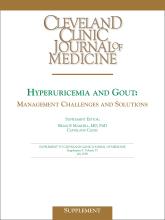ABSTRACT
Gout management requires a comprehensive strategy that considers both acute and chronic aspects of the disease. Acute gout flares should be treated with anti-inflammatory agents as rapidly as possible. The underlying hyperuricemia may be treated with urate-lowering agents initiated at a time appropriate for the individual patient. Successful urate lowering ultimately prevents flares and disease progression and should be started immediately in patients with advanced or tophaceous disease. When urate-lowering therapy is initiated, anti-inflammatory prophylaxis should be used to reduce the risk of flares induced by abrupt changes in urate levels. Regular monitoring of serum urate can ensure therapeutic dosing of urate-lowering agents to achieve levels below 6 mg/dL, which are associated with a reduction in flares and tophi.
- Copyright © 2008 The Cleveland Clinic Foundation. All Rights Reserved.






